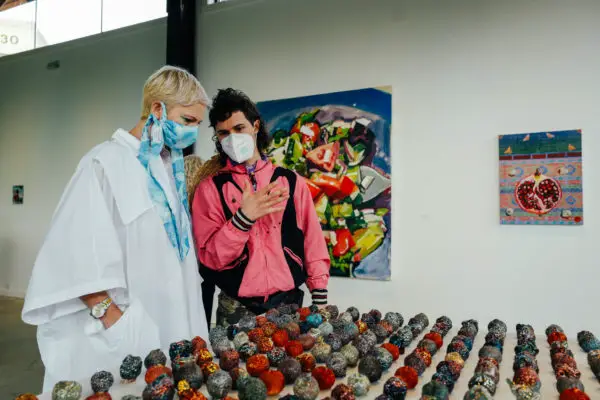
Real estate developer National Resources is rapidly making changes to its many local properties — and iPark 84, located at the former IBM East Campus in East Fishkill, is no exception.
Last year, the company began looking for proposals for ideas for a new visitor center or space to tie the campus together; its selection, the Barns Art Center, may even cement the iPark campus as a cultural destination.
Tara Dalbow, gallery director and curator, was the one who proposed the arts center in the first place, envisioning a site where visitors can connect with nature and the rich history of agriculture in the Hudson Valley. She wanted to emphasize local production, especially amid the local Hudson Valley food and beverage producers that call iPark 84 home.
“On the campus, they have maybe 10 to 15 local producers or manufacturers, food producers, or beverage producers that have their production on the campus,” Dalbow said. “There’s Sloop Brewing, there’s More Good beverages ”” there’s all these different kinds of brands. And then they had this desire to build out something in this new construction, a 3,200-square-foot space.
“So I pitched them the idea of the Barns, of this art center at the nexus of food, farming, ecology and sustainability, because it centered … some synthesis between what else was going on at the campus.”
The campus is located on what was formerly farmland before IBM developed it into a microchip plant, bringing the land use full circle.
Dalbow, a California native who lived in New York City for eight years, was introduced to the Hudson Valley area when she began graduate school at Sarah Lawrence College.
“There was just a lot of energy here and a lot of possibilities for people to be able to do unbelievable things,” she said. “There’s a lot of constraints in New York City for how big you can build something and how scalable you can make anything. I was drawn to the fact that there were so many people here doing really interesting things in new ways and not being afraid to push past whatever parameters you would maybe have in New York City.”
Dalbow is now a Hudson Valley resident herself, living in Beacon. A fiction writer, this is her first time curating for a gallery or being involved in work related to visual arts.
Her preparation for opening the Barns involved dozens of interviews with individuals in the arts and arts education around the Hudson Valley, to figure out what was needed and to figure out how to balance a local focus with the inclusion of art from around the world.
“There’s such a robust cultural landscape here already,” she said. “So how did we do something that wasn’t already being done? I landed on the Barnes as it is now, and I carried it through the first show from 30 different artists throughout the world. There’s a healthy amount of them are regional on purpose, but we also wanted to introduce new perspectives as well.”
The grand opening of the space was held on Aug. 27, at which around 250 attendees were able to explore the art center’s inaugural exhibition, “Tasting Menu,” which “engages all five senses to explore food as meaning, metaphor, and material.”
“For the opening, it was just flooded with support from regional art institutions, which I was so grateful for,” Dalbow said. “It really showed me the strength of this community and how willing they are to celebrate and champion new ideas.”
The Barns is now nearing its next big event, the Harvest Festival, which will take place Oct. 9 and 10 and feature the premiere of “Lost Arts,” an immersive film experience produced by the art center and Northguild, a production company based in Kingston.
The film, which features 10 farmers from around the Hudson Valley, is a celebration of the art and culture surrounding the area’s agriculture and an exploration of how the methods and wisdom of resource cultivation from the past can inform the future of innovation and sustainability for farming and other modern challenges.
Featured farmers include Jack Algiere from Stone Barns Center for Food and Agriculture; Ben and Melany Dobson from Hudson Hemp; and Ken Greene from the Hudson Valley Seed Co., among others; some of them will lead workshops and activities at the Harvest Festival.
The other feature to be unveiled at the festival is the installation “Of Furrows & Lands in Harps” from the internationally renowned artist collective Futurefarmers. It is a large-scale, interactive architectural structure and a public program that will unfold over three years.
For now, Dalbow is hoping to attract interest for the new art focus in the Hudson Valley, but she hopes to expand the reach of the Barns even more in the future, to take full advantage of the space ”” some of which is still occupied by materials from IBM. She envisions studios, space for artist residencies and summer camps and education programs for youth and adults from the community and beyond. There are even plans to host an art show from a local high school.
According to Dalbow, a food hall is also in the works at the National Resources campus, which will further draw visitors to iPark, along with the existing Sloop Brewing Co. and corporate offices, in addition to the Michelson iPark film studios that are currently being expanded there.
“I think that we’re hoping to be a destination for both the local and regional community, as well as people coming up, say, from the city for a weekend away,” Dalbow said. “The exciting part, I think, is that it’s kind of mixed up here ”” like food and farming and an art center. People can come to the brewery, (then) they can then walk into a space celebrating art and maybe they wouldn’t have already thought to seek out that experience on their own. So I’m really excited about this bringing together different people that are drawn to the campus itself for different reasons.”
The Barns Art Center, according to Dalbow, can give visitors important new perspectives not only on the structure of food systems and the current and historical farming practices of the Hudson Valley region, but it may also provide insight on what it means to be part of a community.
“Food systems are at the heart of any community,” she said. “And the reason I think we are experiencing so much turmoil in our current social setup is that we’ve completely disconnected ourselves from our food system. I think returning to having a locally centric approach to how we think about eating and how we think about staying alive and nurturing ourselves and each other is important.”
The Barns Art Center is open on Saturdays and Sundays from 11 a.m. to 4 p.m.


















